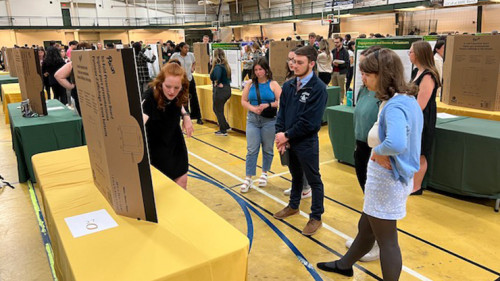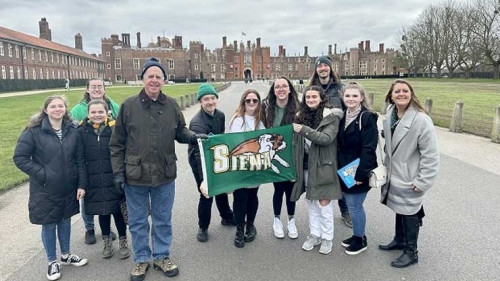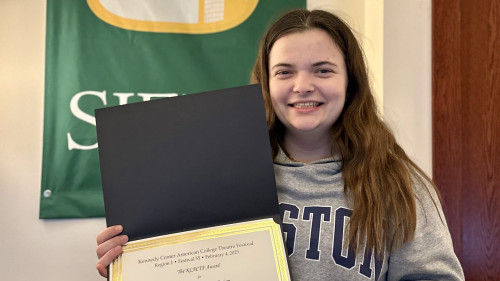
The Middle Eastern nation of Iran has been in turmoil in recent weeks as young people rise up against an autocratic government they believe violates their human rights and degrades their dignity. While opposition to some degree has been ongoing since the Islamic revolution back in 1979, unrest reached a boiling point in mid-September when 22-year-old Mahsa Amini died in the custody of “morality police.” She had been arrested three days earlier for allegedly breaching the strict Islamic dress code for women.
To explore the roots of this uprising, in which thousands of Iranians have been killed, beaten and imprisoned, and how American students can support those protesting, Siena hosted two “Woman, Life, Freedom!” presentations October 26 and 27. The title echoes the popular rallying cry of the Iranian protestors.
“Our students are the leaders of the future and it’s important for them to be aware of what is happening in Iran,” Mahmood Karimi Hakak, Ph.D. professor of theatre and organizer of the events. “Maybe you are not interested in politics, but we are all interested in human rights.”
After a quick overview of the current situation and the decades leading up to it, the audience was shown a brief video featuring footage from rallies, news clips and Tik Toks to give them a glimpse into what’s happening on the streets of Iran, as well as other cities around the world holding rallies to support Iranian protestors. Elham Konjkav, a human rights activist, and Abouzar Kaboudian, Ph.D., a staff fellow at the U.S. Food and Drug Administration, both from Washington, D.C., then shared their personal experiences as natives of Iran.
Konjkav said that as a girl she was raised to be “submissive and obedient, to practice how I was expected to be as an adult.” As a child she wore a pair of red shoes to school simply because she loved the color; her teacher called her parents and asked them to bring in a more “respectable” pair for their daughter to change in to. Red was too bold a color for a girl. Her mother was forced to retire from her career as a nurse because she refused to comply with government orders to wear a hijab headscarf. Her father was unjustly accused of a perceived crime and the family had to flee their homeland.
“We don’t need money. All we are asking is for our voices to be heard,” she said. “One voice is so small, but together they are huge. Your voice matters – use it.”
She said sharing videos and words of support using the hashtags #MahsaAmini and #WomanLifeFreedom can show the world and its leaders what is happening in Iran and how many of its young citizens want freedom so desperately they are literally risking their lives for it.
Kaboudian’s father’s mental health was destroyed as a result of fighting in the Iran-Iraq War in the 1980s. He abused his family, but his wife did not have the right to file for divorce under the regime. He admires the people protesting for a better life.
“All the kids are out in the street shouting ‘Woman! Life! Freedom!” – that means everything,” he said. “And when we say ‘woman’ it does not mean half of society; it means all of Iranian society. Be our voice, too.”
All three panelists stressed that Islam as it is practiced in Iran as government control is not the religion they know and respect, and that westerners should not assume this is what Islam is about.
“This is not Iranian ‘culture,” said Kaboudian, “this is oppression,” while Hakak added, “The Islamic Republic of Iran is neither Islamic, nor a republic, nor is it Iranian.”
Muslim women around the world often wear a hijab, a headscarf that covers the hair, to show their devotion to God. For many women of the faith, it’s a beautiful choice. In Iran, it’s the law. Breaking it can have severe consequences.
Arezoo Hajighorbani, a graduate student at the University at Albany who left Iran shortly before the uprising began, shared that the cameras set up on Iranian roads to catch speeders also catch women who have removed their hijab in the car, or simply had it slip off while driving. That results in a text from the local office of the “morality police” with a request to come in and explain the violation. This could lead to jail time – or worse. Neighbors and friends are encouraged to turn each other in to authorities for not conforming with any number of strict laws.
Aaminah Afzal ’25, president of Siena’s Muslim Student Association, said she gladly wears her hijab as her personal choice, not because she is ordered to do so.
“I felt very proud that we as a community can openly talk about the injustices happening in Iran right now,” said Afzal. “The presentation gave an eye-opening refresher about the freedom I have in this nation to practice the hijab, and encourages me to use my platform to allow others to feel that way as well!”
Liana Hall ’24 said the speakers provided “an impactful sense of clarity” about the issues of women’s rights in Iran.
“It is so important that we, as Americans, understand the truth about the restriction of basic freedoms of women in Iran and stand in solidarity with them,” she said.
The College’s Sr. Thea Bowman Center for Women was one of the co-sponsors of the events. Senior Director Donna Bradbury said the panels support Siena’s mission to guide us toward creating a more just, humane, and peaceable world.
“Our collective attention to the human rights of the Iranian people has the potential to bring about positive changes in the world,” said Bradbury. “The Center for Women will continue to collaborate with campus partners to keep these important conversations going over the coming months."
The panelists said they are able to reach some of their friends and family who are still in Iran not just to see if they are “OK,” but to make sure they are still alive. Some can’t be reached either regularly or at all, and internet service is frequently cut by the government so word of atrocities and protest has trouble reaching the outside world.
“Girls and women and those who love them have simply had enough,” said Konjkav. “They are removing their hijab and cutting their hair and even though they are risking rape and death at the hands of police and soldiers, they say ‘My daily life is basically hell. If I die, at least I am dying for freedom.’”

